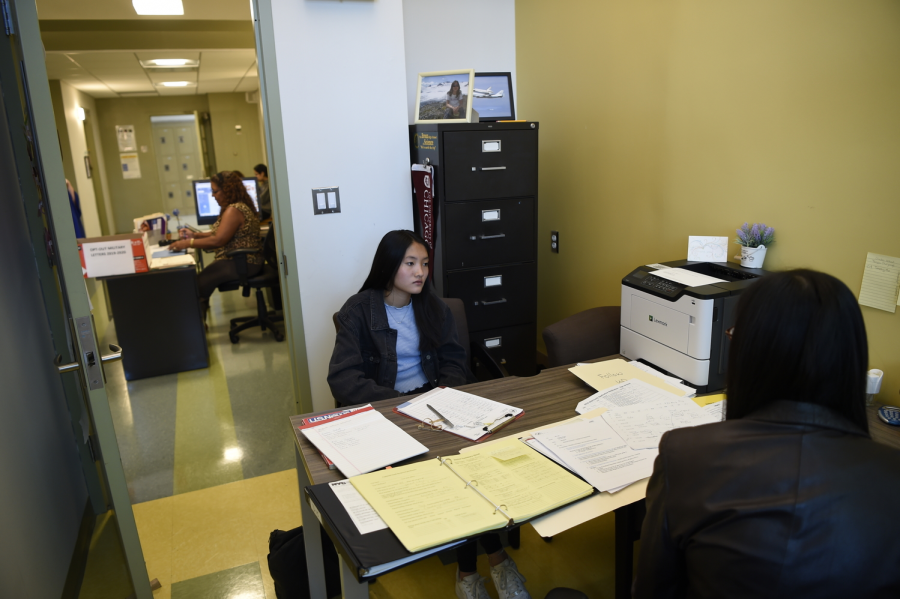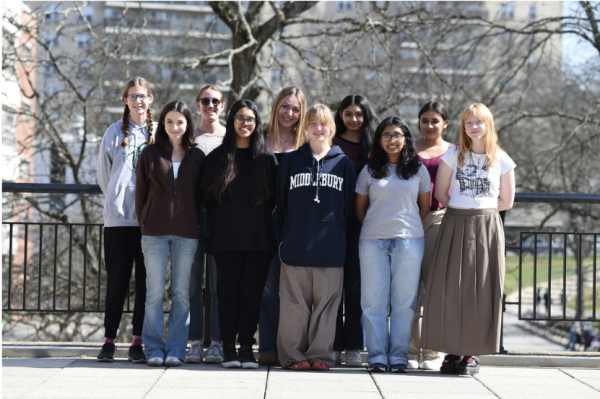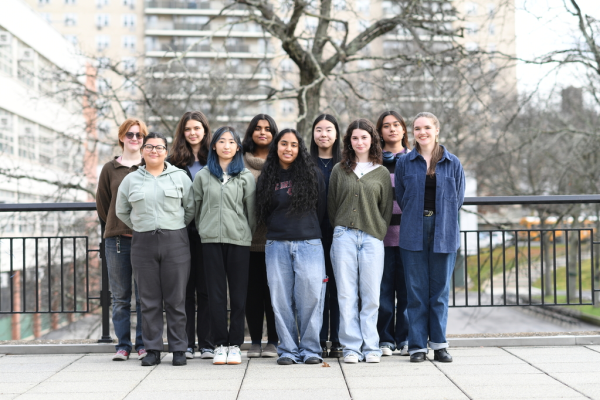Juniors: This One’s For You! Advice From a Senior on Navigating the College Process During the Coronavirus Pandemic
A Bronx Science student works with her guidance counselor on her college application process in the weeks before schools closed on March 16, 2020 due to the Coronavirus Pandemic. Now students meet with their counselors through virtual office hours via Zoom.
Amid the coronavirus outbreak, the American education system has experienced immense changes, from transitioning into a remote learning environment, to canceling standardized testing and shortening Advanced Placement examinations to 45 minutes.
All of these changes have come as a sudden adjustment for the current high school juniors, since junior year serves as the “most important year” in the college application process. Traditionally, students take all their required SATs and ACTs, as well as their SAT Subjects Tests, during their junior year between the months of November and June. They use this time to study, take, and retake the exams until they have earned a score high enough to apply to and impress the numerous selective colleges in the country.
However, this year, with the closing of schools all around the country, juniors are now required to take their courses from the comfort of their homes. Many are now pondering how and when they are going to take the SAT and/or the ACT, since both the College Board and the ACT have canceled all examinations through June 2020. Apart from the difficulties posed by standardized exams, juniors are faced with reduced in-person contact with their guidance counselors. Not to worry, however, as our Guidance Counselors are holding weekly Zoom virtual meetings with the juniors. This is important for juniors, as their guidance counselor needs to know them well enough for the counselor to be able to write a representative, well-rounded recommendation about their academics and personality. Additionally, junior year serves as a time when the juniors impress their teachers with their work ethic, intelligence, and personality for a stellar college recommendation.
For the class of 2021, junior year has come to a standstill and is filled with lots of uncertainty. In this time of crisis, students are persevering and trying their hardest to cope with the changing circumstances. In light of this situation, I have some advice for you all as you gear up toward applying to college in the fall.
Making a College List:
Finding colleges that are the right fit for you is the first and most important step in the college application process. Your very first step should be to decide what colleges you want to apply to and why. This “why” question is really important because it will show up as one of your supplemental questions for many colleges. Knowing the “why” will make your application stand out to college admissions officers, because if you truly want to attend that college and believe that it is the right fit for you, then it will be for a substantial and significant personal reason. Colleges want to see that students did their research about their university, and have genuine reasoning for wanting to attend that college. They want to see how and what you will contribute to the college community. They want to find the student that is the right fit for their college, just as you want to find the college that is the right fit for you. That being said, you do not have to have all this figured out when you begin your college search. However, it is a good thing to keep in the back of your mind since, in the long run, it will help you to pick the right colleges for you and assist you with writing stellar supplemental essays.
Given the current circumstances, learning about schools by touring and visiting them is not possible. Your only source of information will be from the college websites and current alumni. Make sure you read the college websites thoroughly and learn everything there is to know about academics, extracurriculars, and student life. Reach out to current students at the schools and the admissions officers via e-mail with questions. Colleges love seeing students who are interested in learning more about the school. Colleges will also most likely set up virtual tours and events to allow you all to learn more about the schools, so utilize all of the resources that are made available to you. Research is really important, as it will let you figure out what you want and do not want in a college. It will also better prepare you to write your supplemental essays for later.
When you are researching your colleges, do not limit yourself to the most selective schools in the country. The college application process can be very unpredictable. Many qualified and deserving students get rejected from their target and reach schools. So it is advisable that you choose a balanced set of colleges: safeties, targets, and reaches. That way, you will have some colleges to fall back on while you reach for some of the more selective schools. Having said this, make sure that you love every school that you choose to apply to, even your safeties. Safeties are there for a reason. They are the school that you will get into for sure, and in the case that you do not get accepted into your other schools, you have to want to go to your safeties. Love your safety schools just as you love your reach schools.
Writing Essays
The best advice that I have for writing essays is to be honest. Be yourself. Do not try to fabricate yourself and write about something that you think the colleges want to hear about. Colleges do not want this! They simply want to get to know you so tell them about yourself. Tell them your story. The common application essay has several prompts that will help you to brainstorm ideas, but if you feel that none of those prompts suit you, then create your own! There is an option for that as well. The essays are there for you to express yourself and to tell the college admissions officers something that is not written on the application, something that is not just test scores and numbers. Take advantage of this opportunity and truly express your personality and character. The essay is not meant to be something exceptional, nor does it have to be about a life-changing event. It just has to be a piece that expresses who you are.
Beginning to write an essay about yourself can seem daunting, and you may not know what to write about. That’s okay because everyone feels that way. Just think of some ideas, and simply start writing about them. Do not worry about it making sense or it being creative. Once you start writing and start putting some words on the paper, the ideas will start coming to you. You can then go back and make it creative, or tell a story, or whatever it is that you are trying to convey. Just make sure to make it your own. Nothing will be more unique than you just being yourself and telling your story. Use all of the college essays to create a narrative about yourself. Tell the admissions officers about how you came to discover your major, how you spent the past four years of your high school, and how you want to spend the next four. Wherever you get the opportunity, add a new piece of information about yourself. All of this compiled together will give the admissions officers a complete picture of who you are and whether you would fit in at the school.
As for the “why” supplemental essay, be specific. Rely on your research to make your essay stand out, and make it specific to that school. Find out the very little and unique reasons that make you want to apply to these schools. Reach out to professors and talk to them to learn more about their research and experience at the school. Advice from professors can make all the difference between you liking or not liking a school. “I wasn’t a huge fan of a school’s campus based on the tour, but then when I went to visit a professor, I loved the rest of the campus and all the opportunities that I saw posted throughout the building,” said Gidget Rosen ’20, an incoming student at Brown University. College admissions officers are looking for real passion and excitement, so show them exactly what makes you thrilled about going to that specific college.
Stats
When it comes to choosing your safety, target, and reach schools, you are going to need to look at your statistics, the numbers. You are going to need to see if you fit the requirements to apply to these schools. For the most part, your guidance counselors will help you to create a well-balanced list. However, you need to remember that your guidance counselor’s suggestion is simply a suggestion; it is a recommendation to help guide you through the college application process and to ensure that you get accepted into at least one of your choices. Let your counselor’s recommendations guide you, but do not let them make the decision. At the end of the day, you decide what schools you apply to, so choose confidently and apply. Do not let probabilities or statistics discourage you from applying to any of the schools. The college admissions process is a holistic process that looks at essays, recommendation letters, extracurriculars, and test scores to admit students; it looks at everything. And oftentimes it is rather unpredictable. So do not limit yourself to only safety and target school and not apply to reach schools because you do not think you will get in. You will not know if you will get in unless you apply, so apply! Also, try not to compare yourself to others during this process. It can be hard not to do so when you see so many accomplished people around you, but remember that numbers do not dictate everything. Even the most accomplished and the smartest person might not get into one of the many schools to which they apply. Simply trust the process, and make your application stand out as much as possible. And as cliché as this sounds, you are going to get accepted to the school that you belong in and that is the right fit for you.
“I wasn’t a huge fan of a school’s campus based on the tour, but then when I went to visit a professor, I loved the rest of the campus and all the opportunities that I saw posted throughout the building,” said Gidget Rosen ’20, an incoming student at Brown University.
Mayesha Soshi is a Copy Chief Editor for ‘The Science Survey’ and a People Sections Reporter for ‘The Observatory.’ She enjoys journalism because...
Nate Lentz is a Photo Editor and Chief Photographer for ‘The Observatory.’ Nate has always had a great appreciation for the world around him, and uses...











